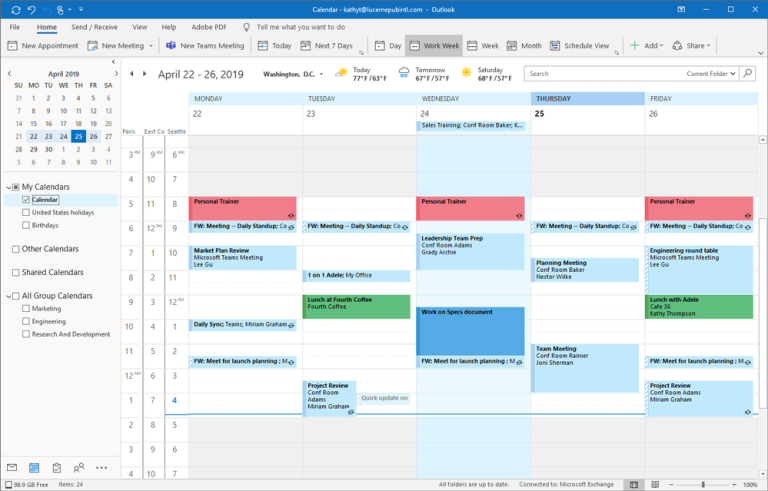Objectives
Learn to talk about the time and dates in order to plan your meetings
- Listen to Katherine Jeffries discussing her schedule with her manager. Who do they have a meeting with on the 23rd?
- Read the script, note the expressions used to talk about time and dates. The listen again.
- Review key points for talking about time, dates and associated prepositions.
- Listen to and then repeat the key expressions.
- Test your understanding of the expressions by doing the quiz.
Script
John: Ok Katherine, can we just look at your schedule for the next two weeks?
Katherine: Sure.
John: Tomorrow, we have a meeting from 9.30 to 11.30 with Sarah Marchant, our CEO to discuss the new payroll software.
Katherine: Tomorrow at half past nine – ok.
John: Starting on Monday next week we have a three-day training course on the new payroll software.
Katherine: What time does it start?
John: The training starts at 9 o’clock. We’ll stop at 10.20 for a coffee break and then again at 12.15 for lunch.
Katherine: 12.50?
John: No, 12.15.
Katherine: And when does the training finish in the evening?
John: It finishes at 4.45. Then, on Thursday 23rd April we have an appointment with a Recruitment agency at 10.45.
Katherine: Sorry – was that Tuesday the 23rd or Thursday the 23rd?
John: Thursday the 23rd at quarter to eleven.
Key points
Telling the time
- AM = in the morning
- PM = in the afternoon
- 12am = midnight.
- 12pm = midday / noon.
- We don’t say ‘The meeting is at 14 o’clock.‘ We say ‘The meeting is at 2 / 2pm / 2 o’clock.‘
- We sometimes use the twenty-four hour clock when we talk about flights / train times. ‘My flight leaves at 19:50.‘
10:00 = Ten o’clock.
10:05 = Five past ten. or Ten oh five.
10:10 = Ten past ten. or Ten ten.
10:15 = Quarter past ten. or Ten fifteen.
10:20 = Twenty past ten. or Ten twenty.
10:25 = Twenty-five past ten. or Ten twenty-five.
10:30 = Half past ten. or Ten thirty.
10:35 = Twenty-five to eleven. or Ten thirty-five.
10:40 = Twenty to eleven. or Ten forty.
10:45 = Quarter to eleven. or Ten forty-five.
10:50 = Ten to eleven. or Ten fifty.
10:55 = Five to eleven. or Ten fifty-five.
Dates
Days of the week
Monday, Tuesday, Wednesday, Thursday, Friday, Saturday, Sunday
Months of the year
January, February, March, April, May, June, July, August, September, October, November, December
Notice that the days of the week and months of the year always begin with a capital letter.
To say the date, use ordinal numbers:
1st the first
2nd the second
3rd the third
4th the fourth
5th the fifth
…….
12th the twelfth
13th the thirteenth
…….
20th the twentieth
21st the twenty-first
…….
30th the thirtieth
Prepositions
Use at for a time.
- ‘The meeting starts at 10 o’clock.’
Use on for a day/date.
- ‘The meeting is on Monday’.
- ‘The meeting is on the 23rd of June.’ (UK)
- ‘The meeting is on June 23rd.’ (US)
Key expressions
Learn 8 key expressions for talking about time and dates
- What time is your appointment?
- When does our meeting start?
- The meeting is at 3pm tomorrow.
- What is the date today?
- It’s the 5th of May.
- My presentation is on the 22nd.
- I have three meetings next Tuesday morning.
- We had a meeting last week.
Listen and repeat
Listen to and then repeat the key expressions
Focus on:
- pronunciation
- intonation
- the rhythm of the language
Each expression will be said twice.
Quiz
Resources
Class audios
Below is the audio to be used with the class activity for the Times exercise.
Below is the audio to be used with the class activity for the Dates exercise.
